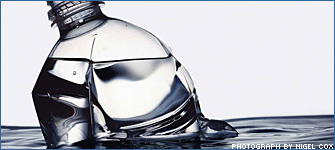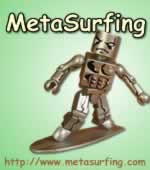
Americans spent more money last year on bottled water than on ipods or movie tickets: $15 Billion. A journey into the economics--and psychology--of an unlikely business boom. And what it says about our culture of indulgence.
Bottled water is the food phenomenon of our times. We--a generation raised on tap water and water fountains--drink a billion bottles of water a week, and we're raising a generation that views tap water with disdain and water fountains with suspicion. We've come to pay good money--two or three or four times the cost of gasoline--for a product we have always gotten, and can still get, for free, from taps in our homes.
When we buy a bottle of water, what we're often buying is the bottle itself, as much as the water. We're buying the convenience--a bottle at the 7-Eleven isn't the same product as tap water, any more than a cup of coffee at Starbucks is the same as a cup of coffee from the Krups machine on your kitchen counter. And we're buying the artful story the water companies tell us about the water: where it comes from, how healthy it is, what it says about us. Surely among the choices we can make, bottled water isn't just good, it's positively virtuous.
Except for this: Bottled water is often simply an indulgence, and despite the stories we tell ourselves, it is not a benign indulgence. We're moving 1 billion bottles of water around a week in ships, trains, and trucks in the United States alone. That's a weekly convoy equivalent to 37,800 18-wheelers delivering water. (Water weighs 81/3 pounds a gallon. It's so heavy you can't fill an 18-wheeler with bottled water--you have to leave empty space.)
Meanwhile, one out of six people in the world has no dependable, safe drinking water. The global economy has contrived to deny the most fundamental element of life to 1 billion people, while delivering to us an array of water "varieties" from around the globe, not one of which we actually need. That tension is only complicated by the fact that if we suddenly decided not to purchase the lake of Poland Spring water in Hollis, Maine, none of that water would find its way to people who really are thirsty.
Good article.

